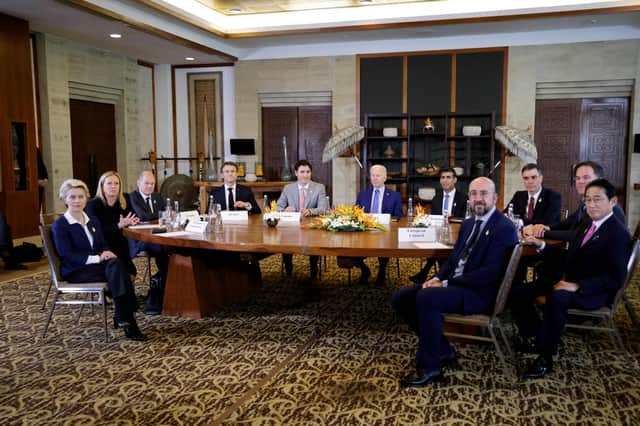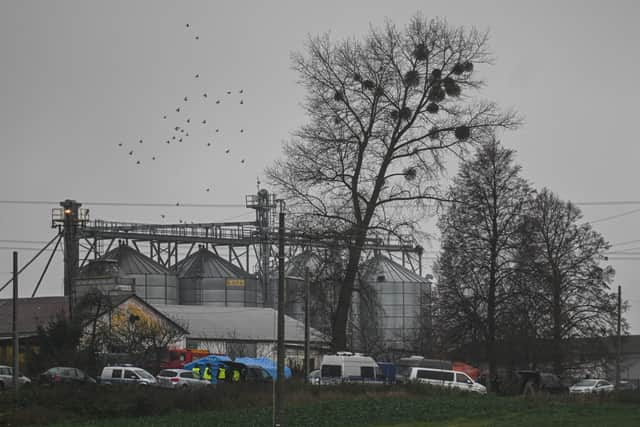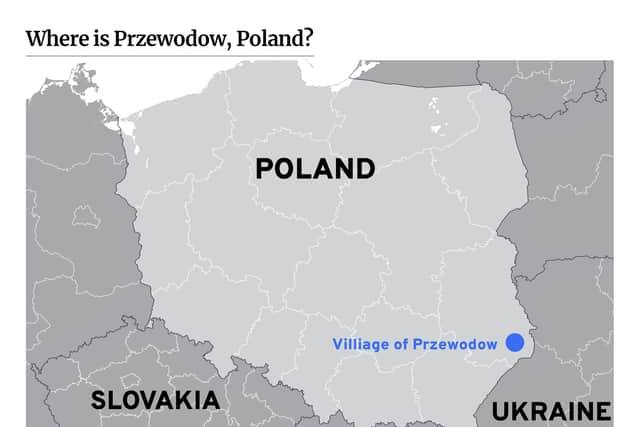What are NATO Articles 4 and 5? How the West could respond to Poland missile strike - explained


Western countries are working hard to identify the source of a missile strike in a Polish village near the border with Ukraine which left two people dead, according to reports last night. It was initially reported by a US intelligence official that the missiles had come from Russia, but US President Joe Biden later said it is “unlikely” that the missile was fired from Russia and “preliminary information” contested the reports.
It now seems as if the missile may have been fired by Ukrainian forces at an incoming Russian missile. Eliot Higgins of the Bellingcat investigative website observed on Twitter that from pictures of the debris it looked like it had been an “air defense missile, rather than a cruise missile” - potentially of the S-300 type that Ukraine has used.
Advertisement
Hide AdAdvertisement
Hide AdThe origin of the weapon is crucial, because if it had come from Russia it could have been construed as an attack on a NATO member country. Throughout the last nine months of the conflict in Ukraine, the fact that Ukraine is not a member of the North Atlantic Treaty Organisation has meant that the West has not felt obliged to give Kyiv direct military assistance, aside from supplying weapons and logistical support.
However, Poland is a member of NATO, which means that a deadly attack on its territory - even if it was just four miles from the border - could trigger a much stronger response from the West. What does the NATO treaty, signed after the Second World War in 1949, say about “mutual defense” - and how could the West respond to the missile strike?
What is Article 4 of the NATO treaty?
Article 4 of NATO’s founding treaty says: "The Parties will consult together whenever, in the opinion of any of them, the territorial integrity, political independence or security of any of the Parties is threatened."
It essentially means that when a member is threatened by military action that could harm its territorial claims, the other members are required to consult one another. As soon as the article is invoked, the issue is discussed and can potentially lead to some form of joint decision or action on behalf of the alliance. Fellow members sitting around the council table are encouraged to react to a situation brought to their attention by a member country.
Advertisement
Hide AdAdvertisement
Hide AdLate last night, NATO spokesperson Oana Lungescu said that the alliance’s secretary-general, Jens Stoltenberg, will chair an emergency meeting of the 30 member states in Brussels today (16 November). The Reuters news agency reported that this meeting is at the request of Poland on the basis of Article 4.


Has Article 4 been invoked before?
Since the formation of NATO back in 1949, Article 4 has been invoked seven times - all in the past 20 years.
- 24 February 2022: Following the Russian invasion of Ukraine, the nations of Bulgaria, Czech Republic, Latvia, Lithuania, Estonia, Poland, Romania and Slovakia requested to hold consultations under Article 4.
- February 2020: Turkey invoked it following increasing tensions as part of the Northwestern Syria offensive.
- 26 July 2015: Turkey made the request following terror attacks and to inform allies of the measures it was taking.
- 3 March 2014: Poland invoked Article 4 as tensions increased in Ukraine as a result of Russia’s aggressive actions.
- 2012: Turkey invoked it twice - once in June after one of its fighter jets was shot down by Syrian air defence and in October when five Turkish civilians were killed by Syrian shelling.
- 10 February 2002: Turkey invoked Article 4 as a result of the armed conflict in Iraq. NATO agreed a package of defensive measures.
What is Article 5 of the NATO treaty?
Perhaps the most well-known part of the treaty, Article 5 states effectively that an attack against one NATO member is considered an attack on all.
The full text reads: “The Parties agree that an armed attack against one or more of them in Europe or North America shall be considered an attack against them all and consequently they agree that, if such an armed attack occurs, each of them, in exercise of the right of individual or collective self-defence recognised by Article 51 of the Charter of the United Nations, will assist the Party or Parties so attacked by taking forthwith, individually and in concert with the other Parties, such action as it deems necessary, including the use of armed force, to restore and maintain the security of the North Atlantic area.
Advertisement
Hide AdAdvertisement
Hide Ad“Any such armed attack and all measures taken as a result thereof shall immediately be reported to the Security Council. Such measures shall be terminated when the Security Council has taken the measures necessary to restore and maintain international peace and security.”


How will NATO respond to the Poland missile strike?
At the time of writing it appears unlikely that NATO will invoke Article 5 of the treaty and respond with force to Russia. The emerging reports that the missile may in fact have been Ukrainian will give the West a convenient exit ramp in terms of escalation that no-one wants.
However, the fact remains that the missile would not have been fired had it not been for the wave of missiles that struck Ukraine on Tuesday, which were aimed at mostly civilian targets. Russia will also be closely watching how the West responds to this incident, even if it was accidental - and the NATO countries face the dilemma that showing no response could encourage Vladimir Putin that he can take further such action without any repercussions.
The next 24 hours will be crucial in establishing the origin of the missile. NATO members will not want to take a position on the matter until it has been clearly established where the missile came from, so there will be intensive investigations at the site of the missile strike and examination of any debris.
A press conference involving Nato Secretary General Jens Stoltenberg is due to take place at 11.30am today (UK time).
Comment Guidelines
National World encourages reader discussion on our stories. User feedback, insights and back-and-forth exchanges add a rich layer of context to reporting. Please review our Community Guidelines before commenting.
